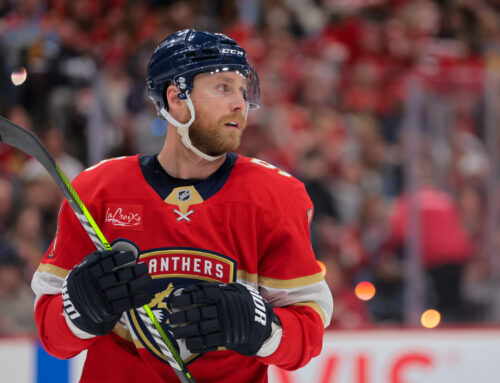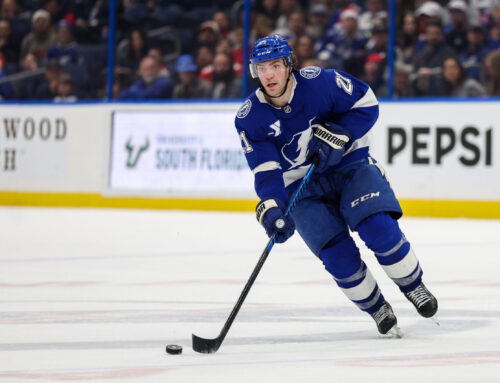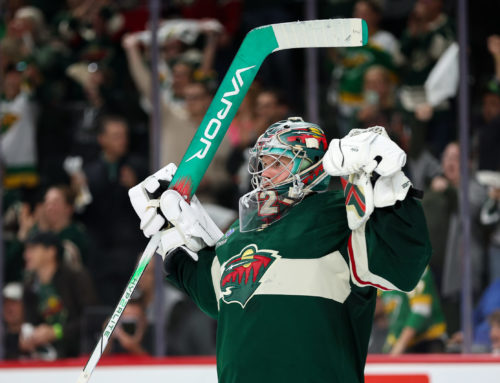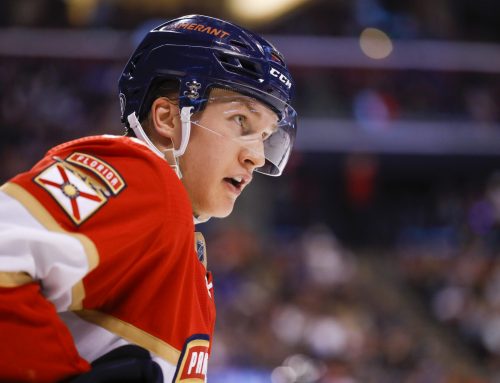
Jeff Carter or Patric Hornqvist – which will lead your fantasy team to victory?
This week we'll focus on two goal scorers – Jeff Carter and Patric Hornqvist – to find out which one is the better own.
Career Path and Contract Status/Cap Implications
Carter was a first rounder (2003) who landed in the NHL in 2005-06. His only point per game season (84 points in 82 games) was 2008-09 with the Flyers. Otherwise, he's never topped 66 points in a full season, although he's scored 25 or more goals in every season where he played 48 or more games dating back to 2007-08, even managing 26 (fourth in the entire NHL) during lockout-shortened 2012-13 campaign.
Hornqvist's was a draft bargain – selected in the seventh round (230th overall) in 2005 and arriving in Nashville during the 2008-09 campaign. He's since played in 363 career games compared to Carter's 636, and is two years younger. Like Carter, Hornqvist's value comes largely via his goal scoring, having reached the 21 goal mark (and between 43 and 53 points) in all four seasons where he's played 76 or more games.
Carter is signed through 2021-22 (when he'll be 37) on an 11 year, $58M deal with a $5.27M yearly cap hit. Hornqvist began a five year, $21.25M deal in 2013-14 with a $4.25M yearly cap hit. Thus, although Hornqvist is cheaper of the two for cap league purposes, the gap isn't as wide as I'd have guessed.
Ice Time
We'll get to see Carter's Ice Time for four different teams, including in 2011-12 with the Blue Jackets (39 games) and Kings (16 games), plus for his 66 point Flyers season in 2010-11. With Hornqvist, although his full season point totals haven't varied much we can see if there's been an evolution in his Ice Time.
|
Season |
Total Ice Time per game (amount ahead of second highest forward) |
PP Ice Time per game (amount ahead of second highest forward) |
SH Ice Time (with rank among team's forwards) |
|
2013-14 |
18:57 (JC) – 2nd 16:51 (PH) – 3rd |
3:16 (JC) – 2nd 2:55 (PH) – 2nd |
1:30 (JC) – 5th 0:00 (PH) |
|
2012-13 |
17:34 (JC) – 3rd 16:13 (PH) – 6th |
2:40 (JC) – 3rd 2:48 (PH) – 1st |
1:12 (JC) – 6th 0:00 (PH) |
|
2011-12 |
18:06 (JC- LA) – 4th 19:37 (JC – CBJ) – 1st 15:19 (PH) – 7th |
2:01 (JC- LA) – 7th 3:32 (JC-CBJ) – 1st 2:33 (PH) – 1st |
1:45 (JC-LA) – 4th 0:19 (JC- CBJ) – 11th 0:00 (PH) |
|
2010-11 |
18:14 (JC) – 4th 15:43 (PH) – 8th |
2:56 (JC) – 3rd (tie) 2:45 (PH) – 1st |
0:39 (JC) – 6th 0:00 (PH) |
I was surprised by Hornqvist's low overall Ice Time each year, until I saw that in 2013-14 Nashville had ten forwards who played in 60+ games and received 13:00 or more of Ice Time, compared to only eight who met that criteria in Los Angeles. On the plus side, his complete lack of SH Ice Time means that at least his lower overall Ice Time is entirely in the form of productive Ice Time.
What remains to be seen is whether (and, if so, how) his Ice Time stands to change under new Nashville coach Peter Laviolette (more on him below). Hornqvist might indeed find himself with more overall Ice Time; but who's to say some won't be SH duty, or that others on Nashville won't cut into his PP Ice Time, which has always been plentiful?
Carter had a nice jump in overall and PP Ice Time from 2012-13 to 2013-14, likely as a beneficiary of Dustin Brown's lost Ice Time. But Brown could rebound, and youngsters like Tyler Toffoli and Dwight King stand to receive more Ice Time next season, so there's a realistic chance that Carter's Ice Time has plateaued or could actually decrease.
If there's a silver lining to the prospect of Carter losing Ice Time, it's that he produced 33 points (including 26 goals) in 48 games with lower Ice Time in 2012-13. Then again, a lot of that had to do with chemistry and regular shifts (more than 70% at even strength according to Frozen Pool) with Mike Richards, who seems like he's genuinely lost a step.
Another negative is that while Carter's SH Ice Time range of 1:12 to 1:45 during each of his seasons with LA isn't a lot in the grand scheme of things, it's noteworthy that his 66 point season in 2010-11 came when he had less SH duty. For all we know, the added penalty kill time might be holding his production back, at least somewhat.
Secondary Categories
|
Season |
PIMs (per game) |
Hits (per game) |
Blocked Shots (per game) |
Shots (per game) |
PP Points (per game) |
|
2013-14 |
0.61 (JC) 0.37 (PH) |
0.94 (JC) 1.01 (PH) |
0.40 (JC) 0.45 (PH) |
3.55 (JC) 3.26 (PH) |
0.19 (JC) 0.22 (PH) |
|
2012-13 |
0.33 (JC) 0.58 (PH) |
0.52 (JC) 1.21 (PH) |
0.48 (JC) 0.37 (PH) |
2.77 (JC) 3.62 (PH) |
0.21 (JC) 0.29 (PH) |
|
2011-12 |
0.125 (JC – LA) 0.36 (JC – CBJ) 0.37 (PH) |
0.50 (JC – LA) 0.20 (JC – CBJ) 0.81 (PH) |
0.25 (JC – LA) 0.33 (JC – CBJ)
📢 advertisement:
0.37 (PH) |
3.37 (JC – LA) 3.33 (JC – CBJ) 3.02 (PH) |
0.12 (JC – LA) 0.28 (JC – CBJ) 0.13 (PH) |
|
2010-11 |
0.49 (JC) 0.59 (PH) |
0.81 (JC) 1.09 (PH) |
0.51 (JC) 0.45 (PH) |
4.19 (JC) 3.35 (PH) |
0.21 (JC) 0.18 (PH) |
Don't be fooled by the 0.28 and 0.29 PP Points figures, as Carter's .28 came in just 39 games for Columbus and Hornqvist's 0.29 in only 24 Nashville games. For all their PP Ice Time, their production is generally disappointing. And don't expect Hornqvist's PP Points to improve simply because Nashville's system becomes less defense-focused, as the team's PP actually hasn't been a weak spot, finishing 12th in 2013-14, 17th in 2012-13, and 1st in the entire NHL for 2011-12 in PP conversion percentage.
In all other categories things were pretty constant for each player year to year and pretty even in comparison to each other. It's notable that Carter's Shots, Hits and PIMs totals had been trending downward until 2013-14, but then each one rebounded strongly. We'll need to see whether his 2013-14 totals can be sustained, or whether they'll fall back to their recent levels or somewhere in between.
Luck-Based Metrics (five on five only, except for Personal Shooting Percentage)
Hornqvist's points output has been pretty consistent, so we'll want to see whether that's also been the case for his luck-based metrics. With Carter, we'll want to compare his numbers for 2010-11 (his second most productive season) and 2012-13 (fourth in the entire NHL in goal scoring) to his two other most recent years, which were less productive.
|
Season |
Personal Shooting Percentage |
Team Shooting Percentage |
PDO |
IPP |
|
2013-14 |
10.5% (JC) 8.9% (PH) |
7.30% (JC) 8.72% (PH) |
995 (JC) 989 (PH) |
72.5% (JC) 68.6% (PH) |
|
2012-13 |
19.6% (JC) 4.6% (PH) |
9.58% (JC) 6.10% (PH) |
979 (JC) 981 (PH) |
73.1% (JC) 66.7% (PH) |
|
2011-12 |
11.4% (JC) 11.7% (PH) |
8.44% (JC) 8.22% (PH) |
989 (JC) 1006 (PH) |
69.2% (JC) 76.9% (PH) |
|
2010-11 |
10.8% (JC) 7.9% (PH) |
10.55% (JC) 8.55% (PH) |
1036 (JC) 1010 (PH) |
67.2% (JC) 71.1% (PH) |
There's no good or bad news here for Hornqvist, as his IPP numbers were all basically within 10% of each other (Carter's were all within 6%) and each PDO was easily within the "normal" range of 970-1030. On top of that, his Team Shooting % was fairly consistent as well, although a bit on the low side.
While some could argue there's room for improvement in Hornqvist's metrics, the fact that they've been this consistent for several years makes it less likely he'll see them improve (and his points with them). But of course these numbers were all in the Barry Trotz era, so it remains to be seen if the team as a whole – and Hornqvist himself – will be "luckier" under new coach Laviolette.
Things are not encouraging for Carter, as his 2010-11 season (which saw him post his second highest point total) was accompanied by abnormally high PDO and Team Shooting % metrics. And although his PDO was more reasonable for 2012-13 (when he potted 26 goals in 48 games), his Personal Shooting % was quite high. Once everything came back to normal in 2013-14, his offensive output went down, suggesting he's not likely to get 66 points or to score a goal every other game again anytime soon.
Laviolette Effect?
A big question surrounding Hornqvist is whether his production was held back playing in the "defense first" system of Barry Trotz. With Peter Laviolette now having been installed as Nashville's coach, it's worthwhile to see what kind of effect he's had on players versus their previous seasons under their former coach(es).
Laviolette had two coaching gigs since 2003 – Carolina and Philadelphia. It's hard to gauge his effect in Carolina, since he took over midseason in 2003-04 and then the lockout resulted in cancelation of the 2004-05 campaign. But we can compare Philadelphia's production in 2008-09 (the last full season before Laviolette arrived) and 2010-11 (the team's first full season under Laviolette).
What we see is the Flyers went from 264 goals and a PP conversion percentage of 22.5% in 2008-09 to 259 goals and a 16.6% PP conversion rate in 2010-11. And while there were four 60+ point scorers in both seasons, two tallied 80+ in 2008-09 while the highest point total for 2010-11 was 76. There was a single 40+ point defenseman in both seasons; however, three defensemen had 30+ points in 2010-11 versus only one in 2008-09 (although Chris Pronger had 25 in 50 games).
Thus, while it's difficult to imagine Nashville's offense doing worse under Laviolette, those who envision forwards – including Hornqvist –suddenly well exceeding their previous career highs likely should temper their expectations.
Carter's Versatility
For 2013-14, Carter was eligible in Yahoo leagues at all three forward positions, compared to just one (RW) for Hornqvist. This is a huge advantage for those in leagues with positional requirements, but it also has a realistic downside in that Carter spent time on a variety of different lines.
In fact, although according to Frozen Pool, in 2013-14 Carter spent 25% of his even strength shifts with Anze Kopitar and Dwight King, his next most frequent even strength line (with King and Mike Richards) amounted to less than 10% of his even strength shifts and three other lines ended up each comprising between only 5% and 9% of his even strength shifts. In contrast, Hornqvist played nearly half of his even strength shifts with only two specific lines.
This situation makes it hard for Carter to develop real chemistry with his linemates, and likely hurts his output, especially when you compare it to his 66 point 2010-11 season, when he had three lines that each accounted for 12-17% of his even strength shifts.
Who Wins?
Carter offers amazing positional versatility but also production that seems likely to be in the 50-55 point range given his many linemates and recent luck-based metrics. Hornqvist has already achieved 45-55 point output in a defense-focused system and now has a coach who'll look to emphasize offense more, although whether that'll help Hornqvist's individual stats is still up for debate.
Here's the thing – poolies will be looking to get on the bandwagon for Nashville forwards, with Hornqvist being among the obvious targets. That might skew his cost higher than a level where his added value (if any) would be enough to compensate. Meanwhile, poolies know that LA will once again deploy their defense-focused system for 2014-15, which means that if anything Carter's cost will be artificially low.
Certainly in leagues with position requirements the choice is Carter. In others, there's a technique that I like to employ when two players seem very comparable, even down to their secondary category output. What I do is wait until one of them is drafted and then look to grab the other pretty soon if the first pick seemed well timed. Sure – by waiting you could miss the chance to get the other player before your pick again, but you also don't risk taking either one too early.





 CHI
CHI BUF
BUF NYR
NYR TOR
TOR ANA
ANA PIT
PIT N.J
N.J L.A
L.A DET
DET CAR
CAR
